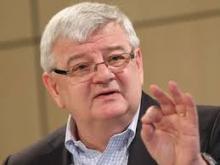You are here
Europe's new war of ideas
Jun 29,2022 - Last updated at Jun 29,2022
BERLIN — Russia’s war in Ukraine will bifurcate Europe once again. East will be divided from West, and the frontier between them will likely be a dangerous, militarily secured zone for the foreseeable future.
Of course, we do not know how or when the war will end. But, following recent developments, it now seems safe to assume that both Ukraine and Moldova will become candidates for European Union membership, and then full members within a few years. The leaders of the EU’s three largest member states (France, Germany, and Italy) and of Romania made that clear when they visited Kyiv last week. They offered full-throated support for Ukraine and Moldova’s membership bids, as did the European Commission immediately thereafter.
This enlargement process will fundamentally change the EU, transforming it decidedly into a geopolitical player and, indeed, into Russia’s main adversary on the continent. With his war of aggression in Ukraine, Russian President Vladimir Putin has made it absolutely clear that he aspires to restore the Russian Empire. As such, he is operating on principles that are wholly incompatible with those of the EU, which is based on equal sovereignty, territorial integrity, the inviolability of borders, and rule of law.
The EU has decided to embrace Ukraine not because it wanted to, or because it has imperial ambitions of its own, but because Putin forced its hand. Putin started the fight and thus confronted Europe with a choice between two clear alternatives. Europe could either submit to the Kremlin’s claims to power, or it could defend its own identity and interests, based on respect for human rights and democratic principles.
The EU has now made its choice, favouring defence of its principles and of freedom. Some critics of its decision will say that it should have tried to negotiate with Russia. But such arguments lack credibility. Even if the EU was willing to broker a dubious compromise with the Kremlin, it wouldn’t have worked, because the EU occupies a position that is now mutually exclusive from that of Putin, with his revisionist dream of empire.
Since neither side can give in, we should anticipate a prolonged conflict. And since military strength and deterrence capabilities inevitably will play a decisive role, the war will definitively change the EU’s character. No longer will the project of economic integration take pride of place. From now on, security and geopolitical interests will have to come first.
The declaration of support for Ukraine and Moldova’s candidacies marks the beginning of the second phase of the EU’s eastward enlargement. Even though neither country’s accession will happen soon, the process itself will have an irreversible effect. The Europe of the future will no longer be realisable without the states of Eastern Europe, provided that they remain willing and able to join.
The reason is simple. When an idea’s time has come, it is unstoppable. By contrast, an idea whose time has passed can linger on only if it is propped up by military power, and even that will not save it in the end. The new conflict between Europe and Russia is about ideas. It is an ideational clash between imperialism and democracy.
Given the historic import of this development, Western Europeans must not succumb to any comfortable delusions about the risks they face. The current European order of states was originally constructed around the goal of integrating Russia and Europe. But Putin has irreversibly derailed that project. It is a thing of the past.
With the war in Ukraine, Europe is facing a test of maturity; it has come of age in a world defined by great-power and nuclear rivalries. Like it or not, these are the geopolitical realities of the early 2020s. In the absence of a continued alliance with the United States, Europe, in its current fragile state, would be too weak to survive in this arena. Interests and values alone will not cut it.
The alternative is for Europe to accept its current weakness and cling to fanciful illusions. Down that road lies submission and dependency. It cannot hope to find mutual consideration in a world defined by great-power rivalry.
Europe’s only real choice, then, is to pursue prudent alliances, develop its own power, and build up its own deterrence capabilities. A coherent strategy to survive the new ideational conflict must replace lingering illusions. Europe must accept that it is living in a dangerous neighbourhood.
Joschka Fischer, Germany’s foreign minister and vice chancellor from 1998 to 2005, was a leader of the German Green Party for almost 20 years. Copyright: Project Syndicate, 2022.









